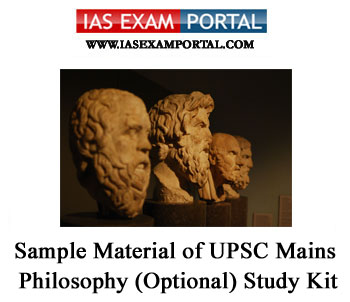(FREE) UPSC Current Affairs 2025 PDF
NEW! The Gist (MAY-2025) | E-BOOKS
(Sample Material) UPSC Mains Philosophy (Optional) Study Kit "Socio Political Philosophy (Pluralistic Theory of Democracy)"

Sample Material of UPSC Mains Philosophy (Optional) Study Kit
Topic: Socio Political Philosophy (Pluralistic Theory of Democracy)
Main support – Robert Dahl
He used the word ‘polyarchy’ to describe pluralist democracy. Lovenstein used the term polycracy for it.
- Pluralist democracy developed in decade of 1970’s. The purpose of theory was to highlight the role of various groups and organisations in the process of democratic decision making.
- According to this theory, in democracy decisions are the result of negotiations, bargaining between various groups of society. In the worlds of Rober Dahl, “The task of decision making in the government is not performed by one class only, but by various classes.”
Tenets of Pluralist Theory
1) According to Pluralist democracy, group not individual is the basis of
society. Individual participates in a political process not as autonomous actor
but as the member of some group.
2) According to this theory, structure of society is federal.
3) Pluralist theory supports multiparty system
4) This theory is great supporter of independence of judiciary which could
mediate if some conflict arises.
5) Pluralists theory supports notion of limited state.
6) This theory supports decentralization of power.
Click Here for UPSC Mains Philosophy Study Material
Criticism
1) This theory gives over – importance to group but according to critics
group will curtail the freedom of individual.
2) According to Ralph Millband “Pluralist democracy makes democracy rule of
organisation instead of rule of people”.
3) This theory may create problem on the way of national integration.
4) According to Marxist, in a capitalist society the organisations of capitalist
have better bargaining opportunities (capabilities) therefore this also a class
rule.
5) According to elitist thinkers all organizations are oligarchic in a nature.
6) If we give over importance to various groups then politics will become
pressure politics.
Significance
1) This theory suitable for a plural society
2) This theory supports decentralization of decision making powers which is
today considered essential for democracy.
Participatory Democracy
Participatory democracy came as a reaction against elitist theory which discourage participation of people in democracy. According to this theory popular participation is a essence of democracy, without which democracy losses its essence.
Participation means active involvement of people in democratic process.
In ancient Greek society, idea of participation in the form of involvement actively through direct democracy supported.
But in Greek society, participation was limited to citizen class.
In modern times, Rousseu gave much importance to direct democracy because it reflects popular sovereignty (England is free only on day of election).
In contemporary times, philosophers like C.B. Macpherson, Pateman, Clumberg (?) Supported participatory democracy.
Principles of Participatory Democracy
Accordingly, in contemporary capitalist societies due to various reasons like unemployment, growing socio-economic disparities, consumerism gender discrimination, people have lost faith in democracy. Therefore main crisis of democracy is to remove the apathy of individuals / citizens in a democracy.
To increase the interest of people in democracy, they support people participation in the decision making process at 2 levels
i) At work place
ii) At local community level.
If people start participating in a decision making process at various levels then they will develop interest in democracy also Participation fulfills 3 purposes-
i) People can defend and promote their own interest.
ii) People will become aware of social, political, economic development and
therefore they will develop their personality various spheres / ways.
iii) It will also fulfill the common good or welfare of society as a whole.
Criticism
1) This theory is applicable in western society only (in light of
industrialized society).
2) This theory according to critics may lead to loss of efficiency because
industry will become the arena of politics.
3) Elitist thinkers also criticized this theory because here elitist will be
under control of people.

